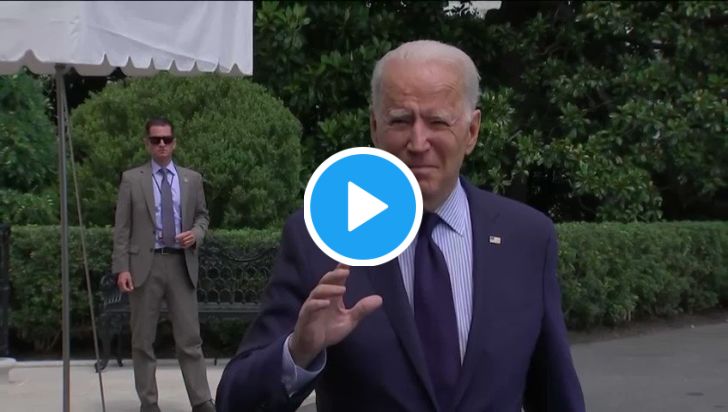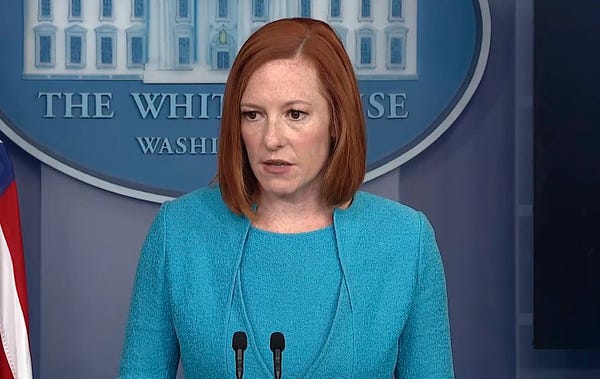The Biden Administration has been in the news in the past few days for two stories involving Facebook. Since there is a lot of misinformation and a great many hot takes based on brief sound bites, I want to delve a bit deeper into both stories.
The first story involves President Biden’s response to a reporter who asked, “What’s your message to platforms like Facebook?”
The Hill has the full video of the question and the president’s answer:
President Biden responds, “They’re killing people. I mean they’re really - Look, the only pandemic we have is among the unvaccinated… and they’re killing people.”
The context of the question is not clear from the clip but presumably is meant to address the second story in which White House Press Secretary Jen Psaki’s statement that the White House was “flagging problematic posts for Facebook that spread disinformation.” Let’s take a closer look at what Psaki said and then, as the press secretary is fond of saying, we’ll circle back to Biden.
Psaki’s statement is troubling enough but it does not tell us much. What kind of posts does the White House consider “problematic?” What action does Facebook take? Is there any penalty for the Facebook users involved?
The Washington Times provides more context on the matter, such as Psaki’s full statement, in which she said, “In terms of actions we are taking or that we’re working to take, I should say, from the federal government, we’ve increased disinformation research and tracking within the surgeon general’s office. We're flagging problematic posts for Facebook that spread disinformation.”
Per the Times, Psaki added that the Administration was “working with doctors, medical professionals, and experts who are popular with their audiences” to get them “accurate information and boost trusted content.”
I don’t have a problem with the government combatting misinformation. In a national emergency, part of the role of government is to ensure that truthful, relevant information is being spread. This is especially important in situations where misinformation can get people killed. To this point, we have not had an indication that the government is forcing the removal of misinformation but only that “trusted” information is being “boosted.”
But wait, there’s more. The Voice of America’s bureau chief quoted Psaki as saying that Facebook “needs to move quickly” to remove misinformation posts. So, is the government coordinating the removal of posts with Facebook?
The answer to that question may be found in an exchange with Psaki and Fox News reporter, Peter Doocy, who asked, “For how long has the Administration been spying on people’s Facebook profiles looking for vaccine misinformation?”
In terms of journalism, Doocy’s question is right up there with “When did you stop beating your wife?” It isn’t so much a question as an accusation and an opinion.
Let me just point out that if you are posting on social media, you have no expectation of privacy for your comments. The very term “social media” reflects the public nature of the online conversation. Almost anyone can see what you post and join the conversation.
You should assume that anything that you post online will one day become public and associated with your name. That’s a powerful incentive to act nice (and sane), even in the relative obscurity and anonymity of the online world. Another term for this is having good character.
In the course of the conversation, Doocy also asked whether “there are any concerns that the things you are trying to block or have taken down might someday turn out to be [true]?”
“We don’t take anything down,” Psaki answered. “We don’t block anything. Facebook and any private sector company make decisions about what should be on their platform.”
“Our point is that there is information that is leading to people not taking the vaccine and people are dying as a result, and we have a responsibility as a public health matter to raise that issue,” Psaki continued.
To me, what seems to be happening is that the White House flags posts with misinformation for Facebook to review. Facebook makes the decision whether to limit the post’s reach, add a warning label, remove it, or ignore it.
What are the First Amendment implications of this activity? I’m not a constitutional scholar (although I play one on the internet), but it seems to be a gray area. We do know that the First Amendment is not absolute. There are permissible restrictions on the right to free speech such as obscenity, threats, and ordinances that restrict the time and place of speech.
As I was researching this article, the example that kept coming to mind was “Loose Lips Sink Ships,” the campaign against careless talk during World War II. In fact, the US government did much more than try to discourage loose lips, there was actually an official Office of Censorship that limited what the media was allowed to print and broadcast.
Obviously, there is precedent for federal limits on the First Amendment. The questions at this point are whether the government’s actions are permissible under the circumstances, keeping in mind that the circumstances include a deadly virus that is still infecting tens of thousands of Americans every day.
As I’ve pointed out in the past, the freedom of speech does not include the freedom to access social media platforms. Further, putting warning labels on the content or limiting its reach wouldn’t seem to be a free speech violation because the speech is still being made. There is no right to a soapbox and a megaphone.
The picture does change a bit, however, when it appears that the government may be directing the social media companies to limit or block certain content. Even if the government does not pressure or coerce the companies to limit the content, the mere existence of the White House’s flags may have an impermissible chilling effect on free speech.
The flip side is that Psaki is also correct that the government has a legal and compelling public health interest in limiting the spread of misinformation about vaccines and the virus. We’ve seen in Supreme Court rulings over the past year that the Court will often defer to regulators on a temporary basis to limit the impact of an emergency.
My best guess is that this is where the courts would fall on the issue of flagging social media posts for misinformation. The government is not censoring speech and it isn’t clear how closely Facebook’s actions correlate to the White House flags. Given Biden’s statement, the White House seems less than thrilled with the company’s cooperation, which is evidence against close collusion between government and social media. The 12 users that Psaki says are the source of most of the misinformation seem to still be posting away. Further, an advisory by the surgeon general on the subject of pandemic misinformation does not ask Americans to censor bad information but to slow its spread.
That brings us back to President Biden’s statement. What the president said is mostly true and defensible. Today the pandemic is a pandemic only among the unvaccinated as I discussed a few days ago. The vaccines are safe and highly effective and the vast majority of new cases and deaths are among people who have not received a vaccine.
But the target of Biden’s comment is wrong. The “they” he should be blaming is not Facebook but the cottage industry of conspiracy theorists and cynical politicians who are manufacturing and spreading lies to scare people away from a life-saving vaccine.




No comments:
Post a Comment